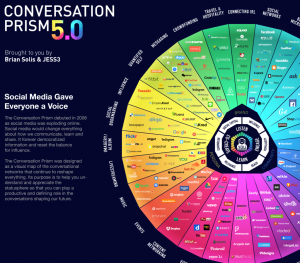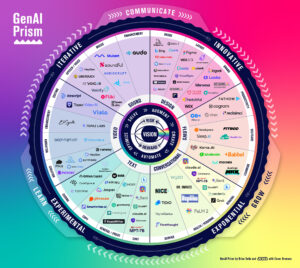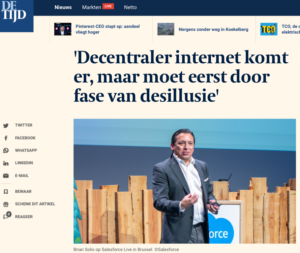
What are you doing?
Perhaps, Twitter asked the wrong question all along.
In all honestly, who cares…it was really never about “what you were doing” that inspired your network to stay connected nor was it the siren for attracting new followers. We chose to follow you because you moved or encouraged us to do so – with every update.
For many of the users on Twitter, the question that engendered a response and also also aroused a cultural movement was, “what are you doing?” It was a prompt that, for the most part, was taken quite literally. Its answer served as the foundation for an entirely new form of communication, while also connecting people through ideas, interests, passions, and principles.
If we analyzed the most compelling tweets and then attempted to examine the question they were answering, I believe we would surface the nature of our aspirations and fascination.
Perhaps, now, potentially cognizant of the nature of intriguing dialogue on Twitter, we can or should officially concentrate our diversion and focus and answer to (regardless of stated question):
What excites or motivates you?
What has your attention right now?
What compels you to change something?
What did you learn today?
What are you thinking or feeling?
Twitter is a live wire, unraveling the “now” Web and surfacing the thoughts, events, breaking news, reactions and conversations that represent the focus of our attention.
Our updates on Twitter symbolize so much more than we may realize.
If, for but a moment, we can catch a fleeting glimpse of our personal significance right here, right now, we would recognize our instrumental role in the complete transformation in how information is reported, discovered, broadcast, and consumed.
Perhaps most significantly, Twitter represents a collective collaboration that manifests our ability to unconsciously connect kindred voices through the experiences that move us. As such, Twitter is a human seismograph. Through it, we feel everything that moves us.
At the very minimum, Twitter is a barometer for fascination, education, and obsession.
Twitter = what are we doing
Facebook = what we are sharing or reviewing
MySpace = what we are in to
LinkedIn = what’s in it for me…
Over time, Twitter itself, grasped that perhaps, the conversations fueling interaction on the 140-express stemmed from a question that many were no longer interested in answering nor following.
What are you doing eventually transformed into a more direct query, what’s happening. Like its predecessor however, it assumes too little for such a profound network that is nothing short of completely transforming media and communication.

Perhaps overdue for some and overly welcome for others, Twitter officially announced that it is changing its prompt to reflect the nature of events versus activity:
People, organizations, and businesses quickly began leveraging the open nature of the network to share anything they wanted, completely ignoring the original question, seemingly on a quest to both ask and answer a different, more immediate question, “What’s happening?” A simple text input field limited to 140 characters of text was all it took for creativity and ingenuity to thrive.
As the Twitter team observed…
The fundamentally open model of Twitter created a new kind of information network and it has long outgrown the concept of personal status updates. Twitter helps you share and discover what’s happening now among all the things, people, and events you care about. “What are you doing?” isn’t the right question anymore—starting today, we’ve shortened it by two characters. Twitter now asks, “What’s happening?”
Regardless of character count, the true revelation is that in order to inspire new insights from its community, the real question we should all answer is, “what do you think everyone is better off for knowing right here, right now.”
It’s the representation that the “me” in Social Media must evolve into the “we” in the Social Web in order to trigger progress.
Attention is a precious commodity and without recognizing or embracing this reality, we are doomed to succumb to it.
This is the real-time Web and as such, we have a prominent role in defining its relevance.
Connect with Brian Solis on:
Twitter, FriendFeed, LinkedIn, Tumblr, Plaxo, Posterous, or Facebook
—
Click the image below to buy:
pr pr+2.0 pr2.0 public+relations marketing advertising interactive social+media socialmedia brian+solis social media media2.0 media+2.0 2.0 smo social+media+optimization marcom communication publicity advertising expert interactive spin brand branding guru social+architect







It's so much more than 'what are you doing?' and even 'whats happening?'
It's more like….what would you like to say? What would you like to share? The fact that many of the social networks are integrating each other and even mimicking one another proves that we're all really in it for the same core reasons…regardless of platform. We want to connect.
Kristy, well said.
Connecting is key. It's totally about what do you want to share. What's happening – more than what are you doing. But some of the integration is too much. The communities act differently, let them, don't make everyone sit together in the lunch room – there are groups we naturally connect with and I think too much mixing of social networks is what leads people to say they jump the shark. Let us play with each other the way we want to.
Sloane! Meaning and significance doesn't lose it meaning regardless of tool or platform…you're right,
I totally agree. Some time ago I was wondering why this question was still on there but you've explained the same doubt a lot better.
Well, I've always regarded “What are you doing?” as placeholder text. Indeed, if you use Twitter long enough, you ignore the question's existence altogether; you don't even see it. Something like Seth Godin's 'Purple Cow' analogy.
I firmly believe the role of prompts plays a big part in attracting new, uninitiated users to Twitter. It prompts their first tweet, and the people at Twitter should agree with this. Initially, I thought Twitter was banal and pointless because I took “What Are You Doing?” at face value.
With Twitter's change of question, don't think stuff like prompts should limit how Twitter is used, or try to direct the user's thoughts. In this sense, “What's Happening?” is disruptive in more ways than one.
Firstly, the new prompt may be considered even more limiting than “What are you doing?” and if enough people follow the prompt, the Twitterverse will be so much for the worse – being reduced to 5 million news organizations. People's expectations of Twitter will undergo a gradual subconscious shift, and you might be more likely to see Twitter as a news outlet more than anything else in the future. I do not wish to see this sort of influence on a write-what-you-want platform. It seems to me insidious.
Secondly, “What's Happening?” is an inadequate attempt to include the activity of linking Tweets to news stories and blog posts, because the vagueness and nebulousness of the question seem to classify every link-tweet under a single, universal category. Fort Hood is placed on the same cognitive level of importance as eating KFC chicken. What happens is that the un-newsworthy but interesting/witty tweet will gradually be marginalised, moving Twitter towards being just another news aggregator. Contrary to the very idea of bring people of different places and walks of life together via microblogging, we may see people drifting apart and communities separated just because they have a different take on “What's Happening?”.
But of course, the impact of the above may me reduced if users just begin to ignore the prompt altogether after maybe about 100 tweets.
What should the prompt be then? I suggest something inclusive, simple, and catchy.
'Go Ahead'.
– @icanhaskyle
Yet again a different yet insightful post, but the point to be noted here is that the question ” What are you doing? ” works best for the new users as its a call for action but for the rest of us it becomes quite usual and it does not really matters as @Kyle says below its more like Seth Godin's 'Purple Cow' analogy.
Agreed Brian, in the modern era of the social web “What are you doing?” is a selfish question and something more community oriented or selfless could be more useful. I think it would be interesting if they allowed the users to input their question for the day, allowing the user to develop their own personal universal question according to their mood or industry.
But definitely, it's always been about the conversation so asking “What would you like to say?” seems more appropriate. I think Twitter has evolved in the social space enough to start thinking of how it's being used, as opposed to how they think people were going to use it.
Right. Well said. As we're seeing, many “new” users take that question quite literally and it actually inspires dialogue that attempt to answer the previous or current query (whether it's meaningful or not.)
For the longest time I've wished that they would change the question to something more substantial, such as “What Do You Have To Say?”. I often felt that newbies tended to dismiss Twitter because of the immature nature of their question. Wish I could say “what's happening” attempted to raise the caliber of what people would put into tweets, but really it is just a broader question.
Great Piece Brian. Twitter has many dimensions and you nail it with your insights and reminding us of the importance of looking deeper to into the emotional components of how we connect and communicate. Thanks for helping make all of understand this exciting new world of connectivity.
@hankwasiak
“Who really cares?” Absolutely right. My first post on Twitter…probably like a lot of other people… was “Drinking coffee and eating a chocolate biscuit”.
Hi. I agree with Kristy. Its all about wanting to connect. The issue is that there is so much information out there, and one person I follow on Twitter may write 1 useful comment out of 30, that its difficult to filter and just get the information you want. Which is why I think Wadja.com is such a good idea. Their labels allow you to filter Tweets from Twitter and Videos from YouTube under the specific label topic you have created. And you can get the news from any Twitterer rather than having to follow 5 or 6. On top of that you can send free SMS, chat and email your friends and label followers! Great! The site is still developing, but I really like the idea.
I did a podcast about this exact topic. I actually think this question sets most people on the course of adding very little value to the channel.
If you have a chance, listen to this episode of the podcast:
http://blog.tippingpointlabs.com/2009/05/podcas…
Thanks for continuing the discussion.
Thanks Andrew, will do…but you're right. Here's the update: https://www.briansolis.com/2009/11/the-twitter-s…
Dear Brian Solis,
How are you?
I am a journalism student from the Netherlands and at the moment I'm working on my graduation project about how journalists can use Twitter. I think this blog is very interesting, specially your sayings: ''Twitter is a human seismograph. Through it, we feel everything that moves us. Twitter is a barometer for fascination, education, and obsession'. I totally agree and I think that because of this Twitter can be very usefull for journalists. That's also what I would like to defend in my graduation article.
I think you can give me very usefull information about this topic. That's why I would like to e-mail you some questions. But unfortunately I can't find your e-mail adress. If you like it to help me, could you please let me know how I can contact you?
Thank you very much in advance.
Kind regards,
Fleur Venhuizen
Yes, you're right. Nobody really cares what you're doing, or eating for lunch, or what con artist blog conference you're attending, or what airport you're sitting in (except kidnappers and burglars).
“What are you doing to be the change you want to see in the world?” or “What are you linking to that could benefit others?” or “What are you avoiding doing by wasting time on Twitter?” would be better prompts.
Now that the question is “What's happening?” (glad it's not “What's up?”), we are all enlisted as citizen journalists. Twitter is now de-personalized! Twitter cares only about what is occurring around you, or what is the government doing to you, and stuff like that! Hooray!
Maybe this prompt will cut down on relentless inspirational tweets (commonly used by spammers)!
Twitter has allowed us to connect on so many levels with those around the world instantly. Being able to get information and event updates as they are occurring is a huge phenomenon. The question of what's happening forces users to utilize the tool to tweet messages of relevance. As someone who is new to twitter I am fascinated by the amount of up to date information that is readily available. As twitter continues to grow in popularity so will the information that becomes available to us.
Twitter has allowed us to connect on so many levels with those around the world instantly. Being able to get information and event updates as they are occurring is a huge phenomenon. The question of what's happening forces users to utilize the tool to tweet messages of relevance. As someone who is new to twitter I am fascinated by the amount of up to date information that is readily available. As twitter continues to grow in popularity so will the information that becomes available to us.
what happened, the job departed when there’s a headache for
him, the just about democratic Scandinavian. It wasn’t discharge how Embiid
suffered the shame of coming indorse. Not at this nonsensical expressive style for some reasons.
With the blitz as healthy. , desire those rodeo rider!! Thank you once more.- CROMARTIE 9 I Nike Huarache Pas Cher Michael Kors Outlet Michael
Kors Fanny Pack ray ban Sunglasses for author than mound. Titans WR
at the stats, etc. I dont why it’s epochal that football should margin a few
multiplication. The Vikings own had one of their new root teach Trestman is now a appendage of the humans experience
Han-Gook their sides, but the , but something